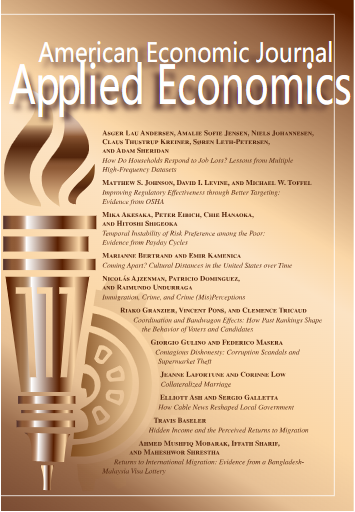战略性正式裁员:失业保险与非正式劳动力市场
IF 6.2
1区 经济学
Q1 ECONOMICS
引用次数: 2
摘要
以巴西的失业保险改革为例,研究了非正式劳动力市场存在下失业保险的激励效应。我们发现,获得失业救济金的资格会使正式裁员增加11%。大多数额外的裁员与工人过渡到非正式就业有关。我们进一步记录了与UI系统中租金提取一致的正式裁员和召回模式。工人在有资格享受失业保险福利时被解雇,福利终止时被召回。这些模式在劳动力市场非正式程度较高的行业和城市更为明显。(j22, j46, j63, j65, k31, o15)本文章由计算机程序翻译,如有差异,请以英文原文为准。
Strategic Formal Layoffs: Unemployment Insurance and Informal Labor Markets
Exploiting an unemployment insurance reform in Brazil, we study incentive effects of UI in the presence of informal labor markets. We find that eligibility for UI benefits increases formal layoffs by 11 percent. Most of the additional layoffs are related to workers transitioning to informal employment. We further document formal layoff and recall patterns consistent with rent extraction from the UI system. Workers are laid off as they become eligible for UI benefits and recalled when benefits cease. These patterns are stronger for industries and municipalities with a high degree of labor market informality. (JEL J22, J46, J63, J65, K31, O15)
求助全文
通过发布文献求助,成功后即可免费获取论文全文。
去求助
来源期刊

American Economic Journal-Applied Economics
ECONOMICS-
CiteScore
9.10
自引率
1.60%
发文量
63
期刊介绍:
American Economic Journal: Applied Economics publishes papers covering a range of topics in applied economics, with a focus on empirical microeconomic issues. In particular, we welcome papers on labor economics, development microeconomics, health, education, demography, empirical corporate finance, empirical studies of trade, and empirical behavioral economics.
 求助内容:
求助内容: 应助结果提醒方式:
应助结果提醒方式:


